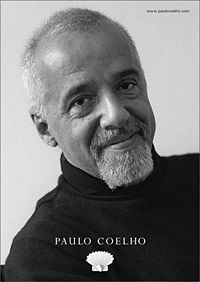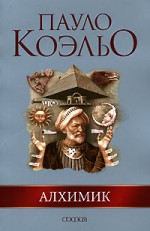Paulo Coelho
The book "The Alchemist" by this author once helped me to stay with my beloved ... And in general, Coelho's parables are a storehouse of wisdom and experience. Who thinks about the work of this author?PS. I'm drunk... YYYY...
And what about these Petit, Masha, Kolya and Sasha writing books? Interesting? Where can I buy/download? :)
Ashly2014
I am also not enthusiastic about Pushkin, although some argue that this is our everything.
This does not prevent me from reading Lermontov with pleasure. Which in turn did not prevent me from falling asleep twice on the fourth page when I tried to read "War and Peace" again (I did not advance further). Some classic authors may not like it, but if a person does not read anything other than modern fantasy and "fashionable" writers, this is already alarming. In 99% of cases, this is not from a great mind.
By the way, I include not only Russian writers among the classics. Hemingway, Saint-Exupery, Goethe are also classics, recognized all over the world. I read it with pleasure, the word "smart" can be safely attributed to these books without quotes. And by the way, not a single work seemed to me written in an uninteresting language.
"Progress does not stand still everywhere, including in writing. And now they write much better than before."
It was scary just from this phrase. Well, a little funny))
I won’t find fault with the word “writingâ€, which could be replaced by a much more appropriate word “literatureâ€, sometimes I myself sometimes write not like that. But the meaning ... You know, I did not quite understand what you mean by "extra words." If primitivization of texts is a good thing, then "progress" will soon make books look like Hollywood movie scripts. Personally, I don’t see anything good in this, and I don’t even see the point in it. If you don't have enough dynamics in books, maybe you should watch movies?
Sp1rT
I read the classics :) And Goethe, and Bulgakov, and Exupery and much more. I like a lot of this. For example, such as "The Master and Margarita", "At the Bottom", "Crime and Punishment", "Fathers and Sons". I also love many of our poets: Pasternak, Akhmatova, Tsvetaeva...
No, I'm not talking about the primitization of texts, but about ... how to explain it :) well, for example, you said that you could not read more than 4 pages of "W&M". Why? :) I didn't like it because it's boring and written in boring language. I'm not talking about Hollywood films. This is complete bullshit. Nekrasov said: "Follow the rule stubbornly: so that words are cramped, and thoughts are spacious." That's what I meant when I said "extra words". In such books as "ViM", and even "Crime and Punishment", which I liked, there are a lot of centipede sentences, a lot of weed words. There is no such tightness of words. Because of this, they are boring to read.
And I love to read books. So the brains at least work, translate incomprehensible icons :) on the page into pictures, sounds and even smells. If the book is well written, of course. Because it is then that you completely immerse yourself in the world created by the writer, you realize yourself in the place where the action takes place. And movies... in movies, the brain is fed a finished picture, and it shamelessly sleeps. :)
"It just became scary from this phrase. Well, a little funny" - but why did the phrase become so scary? Isn't it true? Isn't writing better now than it used to be?
Ashly2014
Well, okay, I won’t argue about unnecessary words, it’s still difficult for me to judge War and Peace - I didn’t read it ... I couldn’t read it rather because I wasn’t interested in the topic (you can learn more about the war there than from some history textbooks, this is good, but I really didn’t want to read about all these “nobles†with their “experiencesâ€) and few people will like to spend a lot of time reading four (seemingly) huge books in school years. Moreover, it was necessary to read "at speed", at school they would not ask if you had time to read everything.
"Don't they write better now than they used to write?"
IMHO - NO! It seems to me that in the 90s normal writers disappeared altogether. Both in our country and abroad. Until quite recently, our national literature had such wonderful writers as, for example, the Strugatsky brothers, who wrote a lot of wonderful works: from the funny and witty, "Monday begins on Saturday" to the philosophical, "Doomed City."
Who is writing now? Writers like Vladimir Sorokin? This is no longer literature, but simply making money. With all the noise around his Blue Fat, this book has already been forgotten and the author has been forgotten. And this at one time was one of the most popular authors in the country, what kept his popularity?! Certainly not on talent - time has already proven this.
The same thing happens in all world literature. Most recently, Dan Brown's The Da Vinci Code was the most reprinted book. The popularity of the book was based on scandals (for which thanks to the Vatican, it seems that they were also paid for PR) and who will buy it now? Maybe yes, but in 5 years no one will even remember her.
Gone are the days when one book was written for several years, rewriting each page 10 times. Paying attention to every little thing. Now you need to give out books at least 2-3 per year, even if you are considered a very serious author of very deep books. Otherwise, you simply will not find a publisher.
I'm generally horrified by our modern literature, it's really scary! Daria Dontsova received the Order of Peter the Great 1st degree! She was put on a par with Tereshkova and Kalashnikov, did she really deserve this ?! Is her service to the motherland so high? Is her "literary success" so great? Not a single writer in the country (well, with the exception of Solzhenitsyn, of course ...) has not been awarded such awards. It turns out that she was recognized as the best in our literature today? I'm almost sure that you are also not enthusiastic about Dontsova, but these are real facts: she is now the No. 1 writer in Russia. Will we compare with Akhmatova?
Paulo Coelho is one of the most widely read authors on earth. He is the author of the international bestseller The Alchemist, which has already been published in 54 languages ​​with a circulation of over 35 million copies.
His work was replenished with the books "The Bridle" (1990), "Valkyries" (1992), "On the banks of the Rio Piedra, I sat down and cried" (1994), "Maktub" (1994), "The Fifth Mountain" (1996), "Book Warrior of Light" (1997) and "Veronica Decides to Die" (1999), "The Devil and Senorita Prim" (2001).
Appointed as an adviser to UNESCO, he took care of overcoming the difficulties experienced by the African continent. He received the highest reviews and international awards, and in 1996 the Minister of Culture of France awarded him the title of Chevalier of the Order of Arts and Letters. In 1999, he received the 1999 Crystal Award from the World Economic Fund and the prestigious Chevalier of the Legion of Honor awarded by the French government.
According to a list published by Lear magazine in 1998, Paulo Coelho was the second most widely read author in the world. His books have been published in over 100 countries around the world.

 ©
©
Le magnifique
At first, when nothing was written in your first post - was it a joke?
And so, I read two or three of his books, I can’t say that I was delighted.
Ha, you forgot to put in Eleven Minutes.
Coelho has very good books! I advise you to read: Alchemist, Zaire, 11 minutes, The Devil and Senorita Prim...
Ah, well, I read "Zaire", "On the banks of the Rio Piedra, I sat down and cried", and "11 minutes". "11 minutes" is not up to the end.
Coelier - a claim to originality. Better instead of "The Alchemist" read "The Little Prince" by Exupery, instead of "Veronica dreams of dying" - "Steppenwolf" by Hesse. "Eleven minutes" and there is nothing to compare with - a work for untouched youths: what is the idea?
Imagine, I would like not only to get a piece from Wikipedia, but also to find out what the author actually writes about.